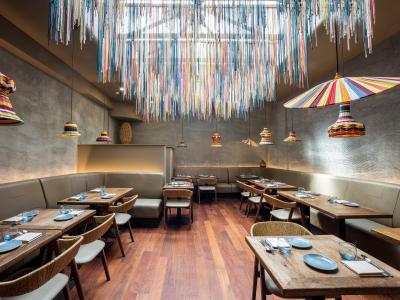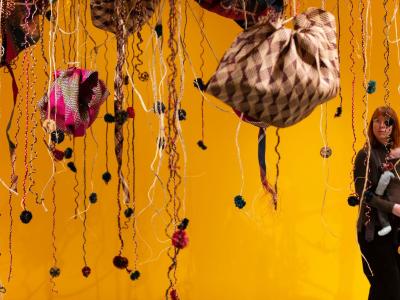One of Brazil’s biggest rappers for over a decade, co-owner of fashion line Laboratório Fantasma and musical chameleon, Emicida is not your average coffee date.
Getting jittery after my second cup in a trendy Shoreditch café, (leading him to later say I could write faster than anyone he’s seen before…a compliment I will never forget), Emicida arrives emanating a glow, as if immune to the London winter.
Indeed, nothing is likely to faze an artist whose risen from a São Paulo favela to being a Coachella and Afropunk alumni, racking up millions of YouTube hits on every video release, playing sold out concerts and festivals as well as internationally promoting his fashion line.
Emicida’s music straddles the huge melting pot of Brazilian music, from samba to hip hop, as well as “Brazilian poetry” jazz and afro-beat – a result of his life-changing journey to Africa. His songs contain masterful lyrics through which he spreads his vision of activism, collaboration and positivity.
I start by suggesting that just the titles to his greatly acclaimed first albums, “The Glorious Return of Someone who was never Here”(2013) and “About Kids, Hips, Nightmares and Homework” (2015) – was the sign of someone who had something to say.
“Yeah, I had thought he had said everything he had to say with those…” he laughs. “And then I began to travel, including a trip to Africa, which changed my life. The world has changed a lot since those albums since then. It’s started to become more polarised and people are connected through negativity. And suddenly I felt I had something new to say, that’s why I wrote this this album, to help inspire people to connect through positivity.”
So how does his new album AmarElo differ from his other acclaimed albums?
“The album name, Amar Elo, is in two parts. Amar meaning love and Elo meaning link. And that’s what the album is all about. It is to make people understand that it’s through love we can link, and if we don’t connect, we are losing a lot.”
Emicida’s new album also features diverse collaborations, from vanguard Cuban sister-duo Ibeyi to giants of MPB (Music Popular Brasileiro) such as Dona Onete and Zeca Pagodinho. As well as embracing the new, it’s clear the Brazilian has a deep appreciation of his roots.
“Brazil has a rich musical history that perhaps the industry didn’t give space to. It’s up to the new generation to highlight the importance of these musical roots and I have that opportunity now.”
Emicida was also hugely inspired by his 2015 trip to Africa. He describes the way people lived, both the beauty and the inequality, and the intense similarities to his own Brazilian culture, in every way, including, musically, between Brazilian Samba and Angolan Semba.
The experience also imbued his new work with new African vigour, political activism
and spirituality. In AmarElo he includes Brazilian Pastors Pastoras de Rosário and Pastor Henrique Vieira, speaking on top of dembow and afro-beat rhythms.
Like so many Brazilians, Emicida recounts how he grew up embracing evangelical religion, but he seems to have none of the reactionary views to gender so often associated with it. In Emicida’s world spirituality means collaborations with prominent LBGTQ+ artists, Pabllo Vittar and Majur, who he says are the “sounds of our moment”.
“I’m very conscious of the horror and danger of some rap promoting sexist or homophobic views. For me, I’ve used musical collaborations to learn about other perspectives and craft my own message of acceptance and tolerance.”
So if its not to rouse hatred and prejudice, what is the role of religion in Emicida’s music and his decision to use gospel singers and pastors?
“I see it in two parts. One, there is a type of connection, an energy that is bigger. And two, religion can be a way of managing faith, this link of spirituality and connection. I wanted to make it relevant and accessible for Brazil. The first song of the album, AmarElo, shows that connection is the biggest force.”
While Emicida doesn’t discard or betray the familiar and popular, he steers it down different path.
“People chase what’s popular, they chase the hate, which is easy to make at this moment. This album was created out of love. Sometimes the music industry can underestimate the emotional capacity of people, their anger or their love. Whatever’s offered to them, they will take. That’s why we have to put out something different.”
Perhaps Emicida is finding different answers because, while most artists use collaborations as a commercial route to new audiences, for Emicida its about “finding a new perspective…I am telling a story but collaborators make that story more beautiful; and a new story begins”
Emicida argues that “rap has always been avante garde” and cites Sugar Hill Records and Sylvia Robinson’s business mentality, along with her niece’s fashion designs, which created the looks and records of artists such as Grandmaster Flash and the Village People. He recognises the wit and politics of rap at this time, emphasising the intelligence and diversity of the community in which he grew up and how this influenced him personally.
“There is an idea that rappers from a poorer background do not have any culture, but I was surrounded by really intelligent people with so much life experience.”
He suggests that this intelligence experience is ever more important with the polarisation of politics.
“It seems that sometimes the only way to talk about politics within music is to be very aggressive. This is why AmarElo centres on connections and love”.
While clearly a serious man with a serious mission, Emicida’s body language - laid-back, laughing and chatting on the sofa – betrays an undeniable enjoyment of life. Brave, different, pioneering, positive, driven and experimental. Most of all, the Paulista comes across as authentic and comfortable with himself. Dressed in effortlessly colourful coats and jumpers, Emicida is here as much as for his fashion brand Laboratório Fantasma, which was featured in São Paulo Fashion Week, ready the Tommy Hilfiger Fashion Week show the following day.
“There aren’t many Brazilian fashion brands created by black men, so the brand was considered unique, therefore relevant for the Brazilian fashion industry. Similar to the music, we wanted to show people who aren’t necessarily seen on the catwalk, such as larger or black models.”
Not only is his music something else; an ever-changing fusion of too many genres to count, but Emicida himself is also an unbelievably unique artist and person. His life experience, musical and fashion creations show how driven, different and exciting he is. His album, AmarElo, is a refreshing change to a climate of hate, with songs only about money or violence. Emicida works to showcase all his life experiences, from religion to his upbringing, and his message of positivity is increasingly needed. AmarElo perfectly captures a future of acceptance and all of Emicida’s work is creating just that.
AmarElo is on general release now online, listen and buy on bandcamp here https://emicida.bandcamp.com/album/amarelo
















